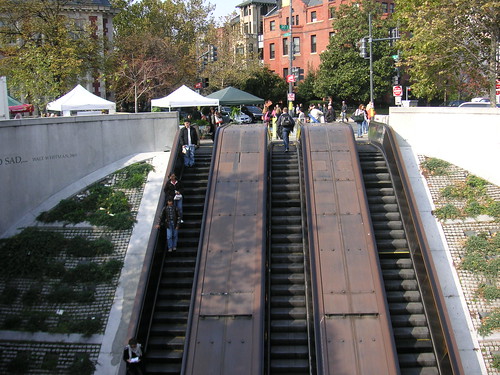Metro is safe: You have better odds of winning Powerball
 I am sure everyone is stunned by the accident that so far has taken the lives of 7 riders on Metro's red line yesterday. This was the worst accident in Metro's 32 year history. One of my coworkers was on the train that struck the stationary train. Luckily, she was not seriously injured, but it struck close to home. Though I usually drive to work, I take Metro sometimes, and I could easily have been on the same train.
I am sure everyone is stunned by the accident that so far has taken the lives of 7 riders on Metro's red line yesterday. This was the worst accident in Metro's 32 year history. One of my coworkers was on the train that struck the stationary train. Luckily, she was not seriously injured, but it struck close to home. Though I usually drive to work, I take Metro sometimes, and I could easily have been on the same train.
Without question, Metro needs to figure out what caused this accident and ensure that the malfunction can never happen again. Metro has automated safety controls that are supposed to ensure that human error cannot cause such an accident. While we still don't know exactly what happend, clearly, both the automated and human controls failed to prevent this accident.
But I would like to point out that Metro is safe. This was the first accident involving loss of life to a passenger since 1983, and only the second such accident in the system's history. There have been four other accidents in which WMATA employees lost their lives, and one other in which passengers were injured.
Metro served 540 million passenger trips between it's opening in 1977 and the first accident killing 3 in 1983. For that period of time, your chance of being killed on a metro ride was 1 in 180 million.
Between 1984 and now, Metro has served 5.2 billion passenger trips. Seven people lost their lives in yesterday's accident. In that time, your chance of being killed on a Metro ride was 1 in 750 million.
In the history of the entire system, 5.8 billion rides, 10 passengers have lost their lives due to an accident, a chance of 1 in 580 million for any given ride.
Your chance of winning the Powerball jackpot each time you play is 1 in 195 million. You are three times more likely to win Powerball with one ticket, than you are to be killed on a given metro ride.
If you ride Metro twice a day, five days a week, your chance of being killed on Metro in a year is about 1 in 1.5 million.
Your chance of being killed by lightning strike in a year is about 1 in 3.8 million.
Your chance of dying of the flu in a year is about 1 in 14,000.
Your chance of being killed in a car accident in the DC metro area in a year is about 1 in 6,700.*
*Estimate: 280,000,000 US Residents. Approximately 42,000 deaths due to automobile accidents annually. Approximately 8,200,000 people in the Baltimore/Washington metropolitan area. This equates to about 1,230 automobile deaths annually in the area for 8,200,000 residents.
Metro Accident History
January 13, 1983 - 3 dead, 25 injured
Janary 6, 1998 - 1 dead (WMATA employee)
November 3, 2004 - 20 injured
October 2005 - 1 dead (WMATA employee)
May 2006 - 1 dead (WMATA employee)
November 2006 - 2 dead (WMATA employee)
January 2007 - 16 injured
June 2009 - 7 dead, 70+ injured (as of this writing)

4 comments:
Totally agree. The Metro is, by far, the safest way to travel in the DC area. I really don't get a lot of the namby-pamying about the accident.
Excellent Post -- a lot of people drove in today to avoid the metro, that is just silly.
yeah, not really. you're comparing apple and oranges. the chance of an accident on metro increases dramatically with age. especially since they don't upkeep well. of course there were no accidents in 1977. it was new. nothing had time to break down yet.
the chances of getting in to a car accident don't increase with time. the chances of winning at powerball don't increase with time.
not that i'm saying metro is "unsafe". but your numbers don't fly. i'm still riding whenever i need to without a second thought.
@dmf: I don't you understood my post. I didn't say there was no chance of an accident in 1977.
All the math I did about metro was chances over a period of time, based on a number of trips every day. I was very clear about whether I was talking about a single trip or an average for a year. The like-comparison for cars is 1 in 7000 vs. 1 in 1.5 million.
Also, Metro's accident history doesn't even support the idea that accidents "increase dramatically with time."
In the first 6 years of operation, there was one accident that killed 3. There was not another accident that killed passengers for 26 years. The other accidents, none of which involved passenger deaths, were due to operator error.
I am not saying that you are incorrect, necessarily, but there is absolutely no evidence to suggest that Metro's safety has "decreased dramatically with time." Before the accident last week, one could have said "Metro's safety has INCREASED dramatically. Whereas there was a fatal accident a mere 6 years after it opened, there has not been one in 26 years."
The numbers fly. It's pretty simple math, and besides, 1 in 7000 is a huge difference than 1 in 1.5 million. You should also bear in mind that the automobile numbers are average - if you actually drive to work, meaning you spend an above-average amount of time in your car, you chances of dying in a car accident are even higher.
Post a Comment